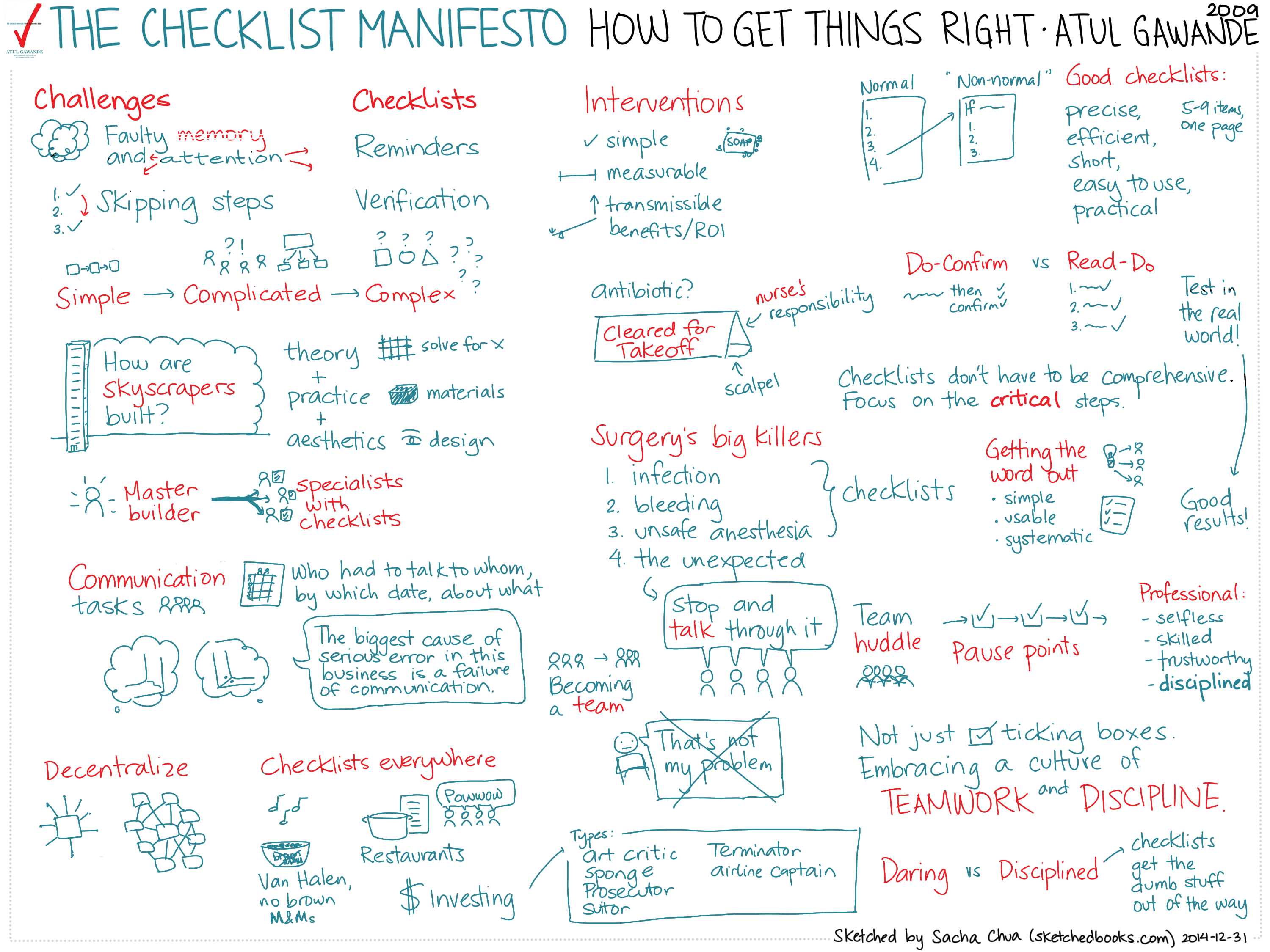Visual book notes: The Checklist Manifesto: How to Get Things Right – Atul Gawande
Posted: - Modified: | kaizen, visual-book-notesAtul Gawande’s The Checklist Manifesto: How to Get Things Right (2009) emphasizes the power of checklists for improving reliability. Errors creep in when we forget things entirely or skip over things we should have done. In medicine, these errors can be fatal.
Gawande draws on his experience as a surgeon, the research he conducted with the World Health Organization, and insights from construction, finance, and other industries that take advantage of checklists to improve processes.
The book discusses ways to address the cultural resistance you might encounter when introducing a checklist. It recommends making sure that checklists are precise, efficient, short, easy to use, and practical. You need to develop a culture of teamwork where people feel that they can speak up as part of a team. You may even need to modify supporting systems to make the checklist doable.
I’ve sketched the key points of the book below to make it easier to remember and share. Click on the image for a larger version that you can print if you want.
I like the reminders that you should design your checklists around logical “pause points,” keep checklists focused on the essentials, and treat people as smart instead of making the checklist too rigid.
The book distinguishes between “Do-Confirm” checklists, which allow experienced people to work quickly and flexibly with a confirmation step that catches errors, and “Read-Do” checklists, which walk people step-by-step through what they need to do. I’m looking forward to applying the book’s tips towards systematizing my sharing. For example, I’m working on a YASnippets in Emacs that will not only display a “Read-Do” checklist for doing these sketched notes, but will also assemble the links and code to do the steps easily. Sure, no one will die if I miss a step, but I think discipline and thoroughness might yield dividends. I also want to develop a good “Do-Confirm” process for writing and committing code; that could probably save me from quite a few embarrassing mistakes.
I’m interested in the diffusion of ideas, so I was fascinated by the book’s coverage of the eight-hospital checklist experiment the WHO conducted. The book discussed the challenges of getting other people to adopt checklists, and adapting the checklists to local conditions. Here’s an excerpt:
… By the end, 80 percent reported that the checklist was easy to use, did not take a long time to complete, and had improved the safety of care. And 78 percent actually observed the checklist to have prevented an error in the operating room.
Nonetheless, some skepticism persisted. After all, 20 percent did not find it easy to use, thought it took too long, and felt it had not improved the safety of care.
Then we asked the staff one more qusetion. “If you were having an operation,” we asked, “would you want the checklist to be used?”
A full 93 percent said yes.
There’s a comparison to be made between the reluctance of doctors to accept checklists and the committed use of checklists by pilots and builders. I came across a quote from Lewis Schiff’s Business Brilliant in this comment by Rich Wellman:
The following quote sums up the essential difference between a checklist for a doctor and a checklist for a pilot.
“How can I put this delicately? Pilots are seated in the same planes as their passengers. Surgeons are not under the same knives as their patients. To paraphrase an old joke, surgeons may be interested in safety, but pilots are committed.”
So checklists are a good idea when you’re dealing with people’s lives, but what about the rest of us? Checklists are good for catching errors and building skills. They’re also great for reducing stress and distraction, because you know that the checklist is there to help you think. That’s why packing lists are useful when you travel.
Already a fan of checklists? Tell me what you have checklists for!
Somewhat related:


3 comments
idvorkin
2015-10-08T12:42:32ZA slightly different view on check lists is scorecards (think checklists to test your planning, prioritization and progress).
An example of using scorecard checklists is to help your reflect on your time investments in the various roles of your life. For example I have scorecards for the roles in my life, entrepreneur/mentor/husband/father/etc, and the habits and desired outcomes for each of them.
I try to review the list monthly, using the time to reflect and course correct on my priorities and future investments.
ps. Huge fan of the book sketches.
sachac
2015-10-16T18:23:26ZOoh, I like scorecards and dashboards too. Good point! It would be interesting to come up with a set of questions/evaluation criteria for regular reflection.
Ivand200
2019-03-17T21:30:46ZAwesome. Great job, thx for sharing Sacha!